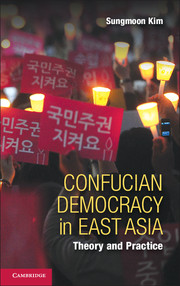Book contents
- Frontmatter
- Dedication
- Contents
- Acknowledgments
- Introduction
- Part I Beyond Thick Confucian Communitarianism and Meritocratic Elitism
- Part II Confucian Democracy in Theory – A Pluralist Reconstruction
- Part III Confucian Democracy in Practice – The Korean Case
- 8 Motivating and Legitimating Confucian Democracy: The Politics of Chŏng
- 9 Confucian Public Reason and the Liberalism of Human Rights
- 10 Confucian Civility and Expressive Liberty
- 11 Confucianizing Multiculturalism
- Bibliography
- Index
- References
11 - Confucianizing Multiculturalism
Published online by Cambridge University Press: 05 June 2014
- Frontmatter
- Dedication
- Contents
- Acknowledgments
- Introduction
- Part I Beyond Thick Confucian Communitarianism and Meritocratic Elitism
- Part II Confucian Democracy in Theory – A Pluralist Reconstruction
- Part III Confucian Democracy in Practice – The Korean Case
- 8 Motivating and Legitimating Confucian Democracy: The Politics of Chŏng
- 9 Confucian Public Reason and the Liberalism of Human Rights
- 10 Confucian Civility and Expressive Liberty
- 11 Confucianizing Multiculturalism
- Bibliography
- Index
- References
Summary
In Korea, “multiculturalism” (damunhwa or damunhwajuui in Korean) is one of today’s hottest topics both in academia and in civil society. According to Dong-Hoon Seol’s recent article, the number of published scholarly articles containing damunhwa(juui) as a key word or a title word amounted to 810 as of November 2010, and the number of articles in the Korean news media on damunhwa(juui) has dramatically increased in recent years – from 137 in 2000 to 14,437 in 2009. Most tellingly, in 2006, as the total number of foreign residents (immigrants and migrant workers combined) approached one million, amounting to approximately 2 percent of the entire Korean population, and as the number of international marriages sharply increased (especially in rural areas), President Roh Moo Hyun publicly declared that Korea is moving toward a multicultural society and this trend is irreversible.
As a result, in the past five years, scholars, consisting mainly of sociologists and anthropologists, have actively discussed (1) the various factors contributing to a multicultural Korea – demographic change, economic demands, and, more directly, periodic immigration policy reforms in each democratic government since 1992, (2) the current state or character of Korean multiculturalism, and (3) both normative-theoretical and policy-oriented practical suggestions on how to create a more decent multicultural society in Korea.
- Type
- Chapter
- Information
- Confucian Democracy in East AsiaTheory and Practice, pp. 270 - 290Publisher: Cambridge University PressPrint publication year: 2014

